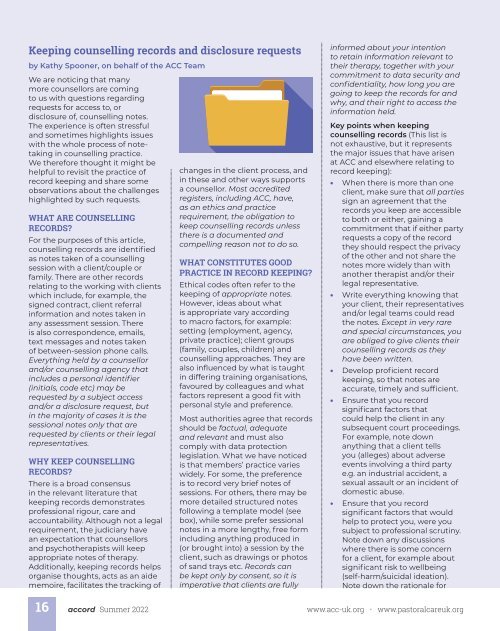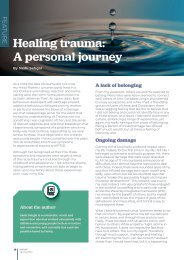ACC E-Accord Summer 2022
You also want an ePaper? Increase the reach of your titles
YUMPU automatically turns print PDFs into web optimized ePapers that Google loves.
Keeping counselling records and disclosure requests<br />
by Kathy Spooner, on behalf of the <strong>ACC</strong> Team<br />
We are noticing that many<br />
more counsellors are coming<br />
to us with questions regarding<br />
requests for access to, or<br />
disclosure of, counselling notes.<br />
The experience is often stressful<br />
and sometimes highlights issues<br />
with the whole process of notetaking<br />
in counselling practice.<br />
We therefore thought it might be<br />
helpful to revisit the practice of<br />
record keeping and share some<br />
observations about the challenges<br />
highlighted by such requests.<br />
WHAT ARE COUNSELLING<br />
RECORDS?<br />
For the purposes of this article,<br />
counselling records are identified<br />
as notes taken of a counselling<br />
session with a client/couple or<br />
family. There are other records<br />
relating to the working with clients<br />
which include, for example, the<br />
signed contract, client referral<br />
information and notes taken in<br />
any assessment session. There<br />
is also correspondence, emails,<br />
text messages and notes taken<br />
of between-session phone calls.<br />
Everything held by a counsellor<br />
and/or counselling agency that<br />
includes a personal identifier<br />
(initials, code etc) may be<br />
requested by a subject access<br />
and/or a disclosure request, but<br />
in the majority of cases it is the<br />
sessional notes only that are<br />
requested by clients or their legal<br />
representatives.<br />
WHY KEEP COUNSELLING<br />
RECORDS?<br />
There is a broad consensus<br />
in the relevant literature that<br />
keeping records demonstrates<br />
professional rigour, care and<br />
accountability. Although not a legal<br />
requirement, the judiciary have<br />
an expectation that counsellors<br />
and psychotherapists will keep<br />
appropriate notes of therapy.<br />
Additionally, keeping records helps<br />
organise thoughts, acts as an aide<br />
memoire, facilitates the tracking of<br />
changes in the client process, and<br />
in these and other ways supports<br />
a counsellor. Most accredited<br />
registers, including <strong>ACC</strong>, have,<br />
as an ethics and practice<br />
requirement, the obligation to<br />
keep counselling records unless<br />
there is a documented and<br />
compelling reason not to do so.<br />
WHAT CONSTITUTES GOOD<br />
PRACTICE IN RECORD KEEPING?<br />
Ethical codes often refer to the<br />
keeping of appropriate notes.<br />
However, ideas about what<br />
is appropriate vary according<br />
to macro factors, for example:<br />
setting (employment, agency,<br />
private practice); client groups<br />
(family, couples, children) and<br />
counselling approaches. They are<br />
also influenced by what is taught<br />
in differing training organisations,<br />
favoured by colleagues and what<br />
factors represent a good fit with<br />
personal style and preference.<br />
Most authorities agree that records<br />
should be factual, adequate<br />
and relevant and must also<br />
comply with data protection<br />
legislation. What we have noticed<br />
is that members’ practice varies<br />
widely. For some, the preference<br />
is to record very brief notes of<br />
sessions. For others, there may be<br />
more detailed structured notes<br />
following a template model (see<br />
box), while some prefer sessional<br />
notes in a more lengthy, free form<br />
including anything produced in<br />
(or brought into) a session by the<br />
client, such as drawings or photos<br />
of sand trays etc. Records can<br />
be kept only by consent, so it is<br />
imperative that clients are fully<br />
informed about your intention<br />
to retain information relevant to<br />
their therapy, together with your<br />
commitment to data security and<br />
confidentiality, how long you are<br />
going to keep the records for and<br />
why, and their right to access the<br />
information held.<br />
Key points when keeping<br />
counselling records (This list is<br />
not exhaustive, but it represents<br />
the major issues that have arisen<br />
at <strong>ACC</strong> and elsewhere relating to<br />
record keeping):<br />
• When there is more than one<br />
client, make sure that all parties<br />
sign an agreement that the<br />
records you keep are accessible<br />
to both or either, gaining a<br />
commitment that if either party<br />
requests a copy of the record<br />
they should respect the privacy<br />
of the other and not share the<br />
notes more widely than with<br />
another therapist and/or their<br />
legal representative.<br />
• Write everything knowing that<br />
your client, their representatives<br />
and/or legal teams could read<br />
the notes. Except in very rare<br />
and special circumstances, you<br />
are obliged to give clients their<br />
counselling records as they<br />
have been written.<br />
• Develop proficient record<br />
keeping, so that notes are<br />
accurate, timely and sufficient.<br />
• Ensure that you record<br />
significant factors that<br />
could help the client in any<br />
subsequent court proceedings.<br />
For example, note down<br />
anything that a client tells<br />
you (alleges) about adverse<br />
events involving a third party<br />
e.g. an industrial accident, a<br />
sexual assault or an incident of<br />
domestic abuse.<br />
• Ensure that you record<br />
significant factors that would<br />
help to protect you, were you<br />
subject to professional scrutiny.<br />
Note down any discussions<br />
where there is some concern<br />
for a client, for example about<br />
significant risk to wellbeing<br />
(self-harm/suicidal ideation).<br />
Note down the rationale for<br />
16 accord <strong>Summer</strong> <strong>2022</strong> www.acc-uk.org • www.pastoralcareuk.org



